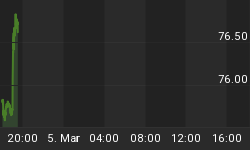Well, agriculturally speaking the answer is no: the United States has minimal banana production and the four leading exporters of the fruit are all located south of the Tropic of Cancer. Sadly, however, once you "peel" away the façade, the U.S. has recently embraced economic policies that could soon lead us to carrying the moniker of "banana republic." Hanlon, being the optimist that he is, gets a little queasy when I use such phrases, but since respectable figures such as Steve Forbes and Larry Kudlow have even raised the question lately, he'll hold his nose and indulge me here!
If the current path remains unaltered, our trillion dollar annual deficits and artificially-derived zero percent interest rates could become habitual, leading eventually to the once endemic economies of Honduras, Columbia and others to be our own.
The two hallmarks of a banana republic are very high rates of inflation coupled with substantial government controls over the economy. Those two factors inevitably lead to high rates of unemployment and poverty. The once-mighty U.S. manufacturing base, over 28% of G.D.P. in 1953, is now just barely above 11% of total output. What was once the world's reserve currency now sadly offers little in the way of interest to our foreign purchasers. And now, since the Federal Reserve has decided it can repeal the business cycle and prevent recessions, the Central Bank has doubled the monetary base in just six months!
Like Hoover before FDR, George Bush's push towards statist economic policies promises to continue unabated under Barack Obama. Mr. Bush gave us Medicare Part D and a nearly 6-year war against Iraq, which helped increase the national debt by over 85%! Not to be outdone, Mr. Obama plans to hit the ground running with a massive stimulus package that, according to many estimates, could exceed $1 trillion dollars! As the unemployment rate climes to a 26-year high, our government is seeking to replace the private sector's role in providing market based employment with mandates from Washington.
But the most egregious aspect of our current economic condition is the buildup of potential inflation. Non-borrowed reserves sitting on the Federal Reserve's balance sheet has jumped from under $2 billion in August of 2008 to over $774 billion as of December 27, 2008. Read that again.
All this high-powered money that's piling up has the potential to be loaned out over 10 times its nominal amount, and presumably it will--eventually. To put that into perspective, the M2 money stock is now only $8 trillion. Gold prices are trading at nearly $900 per ounce. And even with oil trading down over $100 a barrel since this summer's high, Consumer Price Inflation was still up 1.1% Y.O.Y. in November. Since another 72% drop in oil is unlikely, imagine how high C.P.I. inflation will go once banks start lending out their excess reserves.
All of the above sets the stage for a protracted period of inflation and economic turmoil unless the U.S. abandons its pursuit of a centralized command and control economy, and decides that savings and production will stem this tide, not more spending and debt.
Against this backdrop, it is hard to conclude that the fundamentals for gold are anything but wildly bullish (gold stocks are worth a look, too, as Scott Wright just wrote).
The only thing we should envy about any banana republic is its climate, not its economy. Until our politicians show signs of understanding this, keep your focus on hard assets.
Happy new year,















